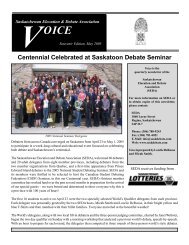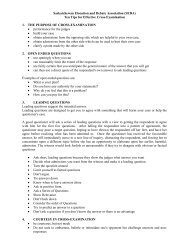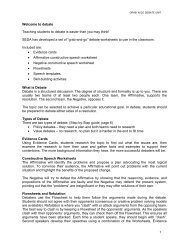Human Cloning - Saskatchewan Elocution and Debate Association
Human Cloning - Saskatchewan Elocution and Debate Association
Human Cloning - Saskatchewan Elocution and Debate Association
Create successful ePaper yourself
Turn your PDF publications into a flip-book with our unique Google optimized e-Paper software.
Man <strong>and</strong> superman Page 1 of 3<br />
The Economist (US), March 29, 2003<br />
Title: Man <strong>and</strong> superman.(the possibility of cloning a person will require that social choices be made ).<br />
Source: The Economist (US), v366 i8317<br />
Date: March 29, 2003<br />
Biotechnology could transform<br />
humanity — provided humanity<br />
wishes to be transformed<br />
WARNING against intellectual<br />
arrogance, Alex<strong>and</strong>er Pope<br />
wrote: "Know then thyself,<br />
presume not God to scan; the<br />
proper study of mankind is<br />
man." But his words have<br />
turned out to be misguided.<br />
Though studying man may not<br />
exactly have led scientists to<br />
scan God, it has certainly led to<br />
accusations that they are<br />
usurping His role.<br />
More drugs; cheaper food;<br />
environmentally friendly<br />
industry. Who could object? But<br />
people do. The image that<br />
haunts biotechnology, <strong>and</strong><br />
perhaps the most influential<br />
piece of science fiction ever<br />
written, is Mary Shelley's<br />
"Frankenstein". When the book<br />
was first published in 1818,<br />
most people did indeed believe<br />
that life was created by God.<br />
Shelley's student doctor apes<br />
that act of divine creation <strong>and</strong><br />
comes a cropper. He has come<br />
to epitomise the mad-scientist<br />
figure: either downright wicked,<br />
or at the least heedless of<br />
humanity's good.<br />
The book's subtitle, though, is<br />
telling: "The Modern<br />
Prometheus". Prometheus, in<br />
the Greek myth, stole fire from<br />
heaven <strong>and</strong> gave it to mankind<br />
with the intention of doing<br />
good. The reason Prometheus<br />
was punished by his particular<br />
set of gods was that he gave<br />
mankind power, <strong>and</strong> with that<br />
power, choice.<br />
Biotechnology is not about to<br />
create a human from off-theshelf<br />
chemicals, nor even from<br />
spare parts. But it may soon<br />
have the power to manipulate<br />
human life in ways which could<br />
bring benefits, but which many<br />
will find uncomfortable or<br />
abhorrent. A choice will have to<br />
be made.<br />
Clones to the left of me...<br />
No one has yet cloned a person,<br />
or genetically modified one, at<br />
least a whole one. But people<br />
are working on technologies<br />
that could help to do these<br />
things.<br />
An existing individual might be<br />
cloned in several ways. The first<br />
would be to persuade a cell (say<br />
a skin cell) from the individual<br />
to be cloned that it was, in fact,<br />
a fertilised egg. That would<br />
mean reactivating a whole lot of<br />
genes that skin cells don't need<br />
but eggs do. As yet, no one<br />
knows how to go about that.<br />
The second way is the Dollythe-sheep<br />
method, which is to<br />
extract the nucleus of an adult<br />
cell <strong>and</strong> stick it in an egg from<br />
which the nucleus has been<br />
removed. That seems to trigger<br />
the desired reprogramming. Or<br />
instead of putting the nucleus<br />
into an egg cell, it might be put<br />
into a so-called stem cell from<br />
an early embryo. Embryonic<br />
stem cells can turn into any<br />
other sort of cell, so might<br />
possibly be persuaded to turn<br />
into entire people.<br />
Regardless of that possibility,<br />
embryonic stem cells have<br />
medical promise, <strong>and</strong> several<br />
firms are currently studying<br />
them. Geron, the most advanced<br />
of these firms, has worked out<br />
how to persuade embryonic<br />
stem cells to turn into seven<br />
different types of normal cell<br />
line that it hopes can be used to<br />
repair damaged tissue. Blood<br />
cells could be grown in bulk for<br />
transfusions. Heart-muscle cells<br />
might help those with coronary<br />
disease. "Islet" insulin-secreting<br />
cells could treat diabetes. Boneforming<br />
cells would combat<br />
osteoarthritis. A particular type<br />
of nerve cell may help sufferers<br />
from Parkinson's disease. Cells<br />
called oligodendrocytes may<br />
even help to repair the<br />
insulating sheaths of nerve cells<br />
in people with spinal injuries.<br />
Geron is also working on liver<br />
cells. In the first instance, these<br />
would be used not to treat<br />
people, but to test potential<br />
drugs for toxicity, because most<br />
drugs are broken down in the<br />
liver.<br />
Such transplanted tissues might<br />
be seen as foreign by the<br />
immune system, but Geron is<br />
keeping its corporate fingers<br />
crossed that this can be dealt<br />
with. Embryos have ways of<br />
gulling immune systems to stop<br />
themselves being rejected by the<br />
womb. In case that does not<br />
work, though, the discussion has<br />
turned to the idea of<br />
transplanting adult nuclei into<br />
embryonic stem cells as a way<br />
of getting round the rejection<br />
problem. This idea, known in<br />
the trade as therapeutic cloning,<br />
has caused alarm bells to go off.<br />
The technique would create<br />
organs, not people, <strong>and</strong> no one<br />
yet knows whether it would<br />
work. But some countries are





